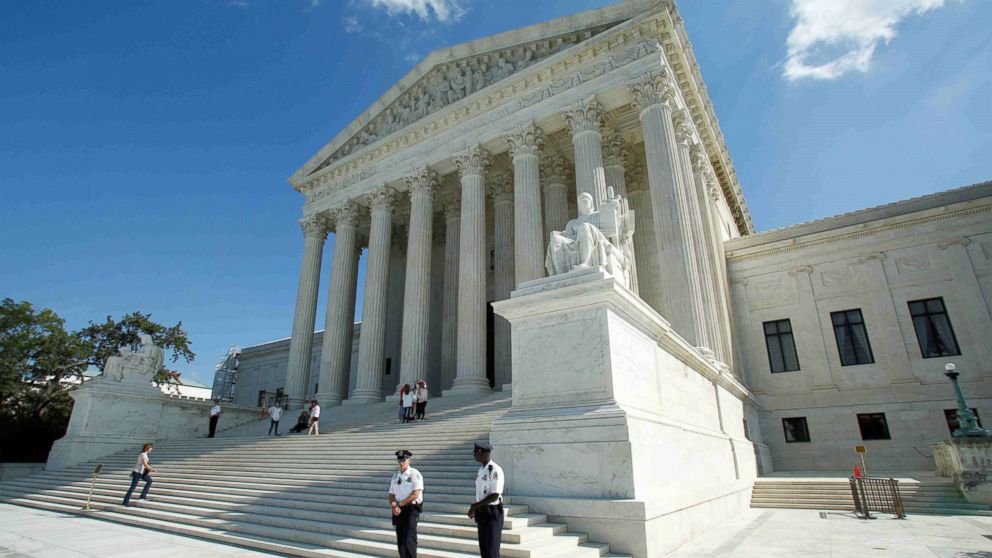What Donald Trump's Presidential Victory Means for the Supreme Court
— -- Donald Trump’s victory in the presidential election will likely have wide-ranging implications for the nation’s highest court, which has had only eight sitting members since the death of conservative Justice Antonin Scalia earlier this year.
For some clarity on what Trump’s victory means and what might come next, we spoke to ABC News contributor and Benjamin N. Cardozo School of Law professor Kate Shaw.
Most immediately, what happens to Merrick Garland, the man President Barack Obama named to replace Justice Antonin Scalia?
Kate Shaw: Judge Garland’s nomination will technically remain pending until the Senate adjourns or the White House withdraws it, but it’s clearly not going anywhere. At some point, probably sooner rather than later, Garland will exit the limbo he’s been in since March, when President Obama nominated him, and resume hearing cases on the D.C. circuit, where he’s still the chief judge.
With Garland’s nomination going nowhere, who are some of the people Trump might nominate to replace Scalia? And what do we know about these individuals broadly?
KS: Most of the time, we end up making informed guesses about these things, but here we have a road map. Trump has put out two lists of potential nominees. The lists, which were evidently compiled with help from the Heritage Foundation and the Federalist Society, consist mostly of conservative sitting judges, both state and federal, in addition to one sitting senator, Utah’s Mike Lee. Although Lee previously indicated that he’s not interested in leaving the Senate for the court, he may take a different view now that Trump is the president-elect.
The court doesn’t have any former state-court judges on it — and hasn’t since the retirement of Justice David Souter in 2009 — so someone like Justice Joan Larsen, a former Scalia clerk now on the Michigan Supreme Court, may draw interest from the Trump transition team. Another interesting outside possibility, though not a state-court judge, is Margaret Ryan, a former active duty Marine and former Justice Clarence Thomas clerk who’s now on the Court of Appeals for the Armed Forces.
Trump’s lists are also interesting in whom they omit — powerful D.C. lawyers like George W. Bush’s Solicitor General Paul Clement and prominent conservative judges like the D.C. circuit’s Brett Kavanaugh. Trump is, of course, not limited to the lists, so I’d expect folks like that to get a look as well.
Republicans will control the Senate when Trump nominates a Scalia replacement. How does the confirmation process work? Can Democrats block the nomination? Do they have any power? How many votes do they need to confirm a nominee?
KS: Supreme Court nominees can be filibustered, so it generally takes a filibuster-proof 60 vote supermajority, which the Republicans don’t have, to get a Supreme Court Justice confirmed. [It wasn’t always this way. Two of the justices on the court were confirmed without reaching 60 votes. Justice Clarence Thomas was confirmed 52 to 48, and Justice Samuel Alito was confirmed 58 to 42.] But recent years have seen an increase in the use of the filibuster in judicial confirmations, so it doesn’t seem likely that anyone would make it onto the Supreme Court without 60 votes.
The Democrats changed the filibuster rule under Harry Reid’s leadership in 2013, eliminating its use for all lower court judges but stopping short of the Supreme Court. But there has been talk of expanding the rule change [sometimes known as the nuclear option] to include the Supreme Court. Earlier today Senate Majority Leader Mitch McConnell was asked about this, and he declined to comment. But people like Sen. Lindsey Graham have suggested that there’s a good chance of this happening sooner or later, which would mean it would require only 51 votes to confirm a Supreme Court nominee.
Looking at the next four years, are any justices expected to step down? If so, who?
KS: Well, it’s an aging court. Justice Ruth Bader Ginsburg is 83. Justice Anthony Kennedy is 80. Justice Stephen Breyer is 78. It’s hard for me to see any of those three retiring voluntarily in the next four or even eight years [Ginsburg and Breyer because they would not want Trump naming their successors, Kennedy because he’ll remain the crucial swing vote in a wide range of cases for the foreseeable future]. But it’s of course conceivable that a health issue could arise for one or more of them.
If Trump is able to replace sitting liberal justices with more conservative ones, could they undo decisions such as Roe v. Wade? What about the Supreme Court decision that gave marriage rights to same-sex couples?
KS: A single Trump nominee isn’t likely to change the law in either of those areas. But yes, if Trump has the opportunity to put a second or even third justice on the court, Roe v. Wade could be overruled or at least dramatically narrowed. Same-sex marriage seems far less vulnerable to me. Unwinding a decision when literally hundreds of thousands of couples have married based on it would raise so many practical questions that I think the justices would just steer clear, even if they believed the case was wrongly decided.
Ali Rogin contributed to this report.




